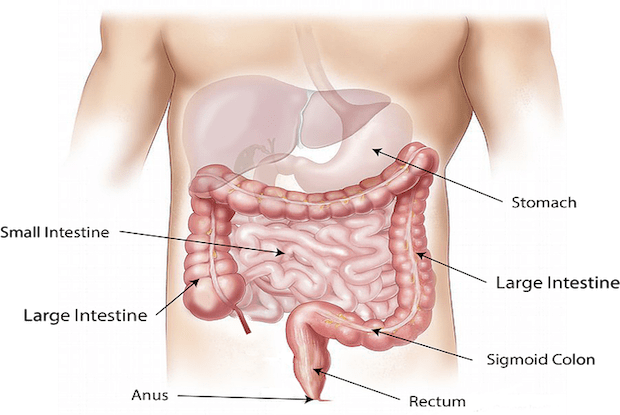Table of Contents
a. The Function of the Intestines
III. What are the Symptoms of IBS?
IV. When to See a Doctor About IBS
V. What are the Risk Factors for IBS?
VII. Treatment Medications for IBS
How Does the Bowel Work?
There are dozens of conditions that may affect your gastrointestinal (GI) system throughout your life. Irritable bowel syndrome (IBS) is one common stomach issue that affects the lower GI tract. IBS can cause severe discomfort and lead to disruptions in a person’s life. Before IBS can be explained, the anatomy of the stomach needs to be understood.
Most of us don’t give much thought to what happens inside our bodies after eating or drinking something. The body does several important processes to convert nutrients into fuel for the body. What we consume goes through the GI tract, which is a series of hollow organs joined in a long tube from the mouth to the anus. These organs include the mouth, esophagus, stomach, small intestine, large intestine, and anus. [1]
Each part of the system moves food and liquid through the GI tract, absorbs liquid, and breaks down food. The intestines move substances through the body through peristalsis, which are muscle contractions of the intestines. [1] Those with IBS feel an increased amount of peristalsis, which manifests as painful cramps. Several medications are available to assist in IBS symptoms, including Xifaxan (rifaximin), Linzess (linaclotide), and lubiprostone. Read on to learn more about symptoms and risk factors of IBS. [2] If you notice that you are experiencing stomach pains, you may be diagnosed with IBS. IBS affects your lower gastrointestinal tract, including the small and large intestine. The first warning signs of IBS typically include stomach pain and a change in the appearance or frequency of bowel movements. In the case of IBS, the colon looks normal but is not working properly. Most researchers are unsure of the cause of IBS, but it is thought stress can significantly worsen this condition. IBS is chronic and can cause long-lasting harm to the intestines. Contrary to popular belief, there is no connection to IBS and Crohn’s disease, ulcerative colitis, and other bowel diseases. [2] Many people may dismiss IBS symptoms because they may appear like a variety of other stomach issues. Symptoms vary, but they are often similar and occur for a long time. The most common types include: These symptoms are unpleasant, but most people do not consider them serious. If these symptoms persist, it is essential to seek your doctor’s advice. In some cases, changes in bowel movements can be indicative of more serious GI conditions. The earlier you start treatment for IBS, the less likely you are to have permanent intestine damage. Serious signs and symptoms of IBS include: Everyone may experience mild IBS symptoms, but some people are more likely to develop a chronic intestinal problem. Interestingly, younger people under the age of 50 are at an increased risk of IBS. IBS is more common in women, which is thought to be a result of estrogen fluctuations. If you have a family history of IBS, genetics may play a role in your GI health. A mixture of genetics and environment is one common cause of this condition. A history of mental health issues, depression, or anxiety can also trigger IBS symptoms. [3] IBS occurs to everyone for a different reason, but some common factors appear to lead to IBS. The following factors may cause IBS: Nervous system abnormalities: There are nerves in your digestive system, and abnormalities in this part of the body can cause abdominal discomfort from your stomach stretching with gas or stool. If the brain and intestine signals overreact to normal changes in the digestive process, IBS symptoms may occur. Infection: If you experience severe diarrhea due to a virus or bacteria, IBS may develop from bacterial overgrowth. Usually, diarrhea goes away on its own, but if symptoms don’t resolve after a few days, talk to your doctor. Changes in gut microbes: Sometimes, the environment of your gut changes over time. The number of bacteria, fungi, and viruses may fluctuate and cause IBS symptoms. Research suggests that the gut microbes of IBS patients are often different than patients without IBS. [3] If you are diagnosed with irritable bowel syndrome, your doctor will tailor a specific treatment plan for you. Linzess (linaclotide) and lubiprostone are two medications that can treat bowel problems like IBS and chronic constipation. These medications are known as chloride channel activators. These drugs increase the amount of fluid in your intestines and improve symptoms of bloating and abdominal pain. [4] If you have IBS with chronic diarrhea, you may be prescribed Xifaxan (rifaximin). This drug is commonly used for traveler’s diarrhea but also improves IBS symptoms. Xifaxan is an antibiotic that kills bacteria and prevents them from growing in the intestines. [5] Talk to your doctor if you believe you are experiencing IBS symptoms. The content in this article is intended for informational purposes only. This website does not provide medical advice. In all circumstances, you should always seek the advice of your physician and/or other qualified health professionals(s) for drug, medical condition, or treatment advice. The content provided on this website is not a substitute for professional medical advice, diagnosis, or treatment.
a. The Function of the Intestines
What is IBS?
What are the Symptoms of IBS?
When to See a Doctor About IBS

What are the Risk Factors for IBS?
What Causes IBS?

Treatment Medications for IBS
